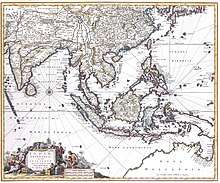
Sukarno was an Indonesian statesman, orator, revolutionary, and nationalist who was the first president of Indonesia, serving from 1945 to 1967.

The Communist Party of Indonesia was a communist party in the Dutch East Indies and later Indonesia. It was the largest non-ruling communist party in the world before its violent disbandment in 1965. The party had two million members in the 1955 elections, with 16 percent of the national vote and almost 30 percent of the vote in East Java. During most of the period immediately following the Indonesian Independence until the eradication of the PKI in 1965, it was a legal party operating openly in the country.
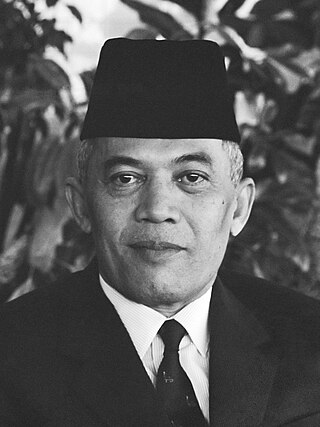
Abdul Haris Nasution was a high-ranking Indonesian general and politician. He served in the military during the Indonesian National Revolution and he remained in the military during the subsequent turmoil of the Parliamentary democracy and Guided Democracy. Following the fall of President Sukarno from power, he became the Speaker of the People's Consultative Assembly under President Suharto. Born into a Batak Muslim family, in the village of Hutapungkut, Dutch East Indies, he studied teaching and enrolled at a military academy in Bandung.
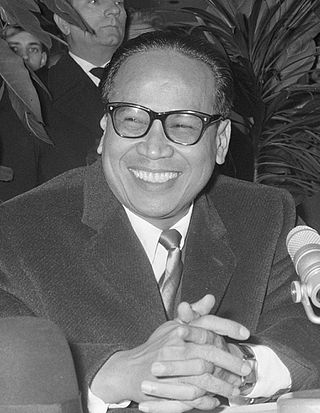
Subandrio was an Indonesian politician Foreign Minister and First Deputy Prime Minister of Indonesia under President Sukarno. Removed from office following the failed 1965 coup, he spent 29 years in prison.
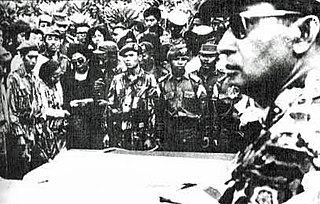
Indonesia's transition to the New Order in the mid-1960s ousted the country's first president, Sukarno, after 22 years in the position. One of the most tumultuous periods in the country's modern history, it was the commencement of Suharto's 31-year presidency.
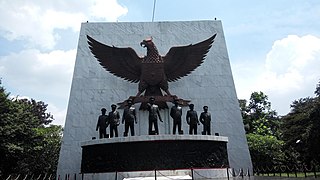
The Thirtieth of September Movement was a self-proclaimed organization of Indonesian National Armed Forces members. In the early hours of 1 October 1965, they assassinated six Indonesian Army generals in an abortive coup d'état. Later that morning, the organisation declared that it was in control of media and communication outlets and had taken President Sukarno under its protection. By the end of the day, the coup attempt had failed in Jakarta. Meanwhile, in central Java there was an attempt to take control over an army division and several cities. By the time this rebellion was put down, two more senior officers were dead.

Guided Democracy was the political system in place in Indonesia from 1959 until the New Order began in 1966. It was the brainchild of President Sukarno, and was an attempt to bring about political stability. Sukarno believed that the parliamentarian system implemented during the liberal democracy period in Indonesia was ineffective due to its divisive political situation at that time. Instead, he sought a system based on the traditional village system of discussion and consensus, which occurred under the guidance of village elders. With the declaration of martial law and the introduction of this system, Indonesia returned to the presidential system and Sukarno became the head of government again.

Sarwo Edhie Wibowo was an Indonesian military leader and the father of Kristiani Herrawati, the former first lady of Indonesia, and the wife of President Susilo Bambang Yudhoyono and also the father of Chief of Staff Pramono Edhie Wibowo. As an army colonel, he played a direct role in directing troops during the Indonesian killings of 1965–66, in which more than half a million Indonesian civilians died. With Suharto's blessing, Wibowo initiated the slaughter. Later, he served as Chairman of the BP-7 center, as Indonesia's ambassador to South Korea, and as governor of the Indonesian Military Academy.

The Order of Eleventh March, commonly referred to by its syllabic abbreviation Supersemar, was a document signed by the Indonesian President Sukarno on 11 March 1966, giving army commander Lt. Gen. Suharto authority to take whatever measures he "deemed necessary" to restore order to the chaotic situation during the Indonesian mass killings of 1965–66. The abbreviation "Supersemar" is also a play on the name of Semar, the mystic and powerful figure who commonly appears in Javanese mythology including wayang puppet shows. The invocation of Semar was presumably intended to help draw on Javanese mythology to lend support to Suharto's legitimacy during the period of the transition of authority from Sukarno to Suharto.

Major General (Ret) Basuki Rahmat was an Indonesian general, National Hero and a witness to the signing of the Supersemar document transferring power from President Sukarno to General Suharto.
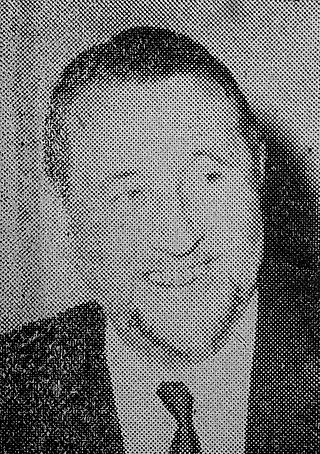
Sir Andrew Graham Gilchrist was a British Special Operations Executive operative who later served as the United Kingdom's Ambassador to Ireland, Indonesia, and Iceland during the Cold War.
This is a list of activities carried out by the U.S. Central Intelligence Agency in Indonesia.

Lukman Njoto or Njoto was a senior national leader of the Communist Party of Indonesia (PKI), who joined the party shortly after the country's declaration of independence, and was killed following the 1965 coup attempt.

Large-scale killings and civil unrest primarily targeting members of the Communist Party (PKI) were carried out in Indonesia from 1965 to 1966. Other affected groups included alleged communist sympathisers, Gerwani women, trade unionists, ethnic Javanese Abangan, ethnic Chinese, atheists, so-called "unbelievers", and alleged leftists in general. According to the most widely published estimates at least 500,000 to 1.2 million people were killed, with some estimates going as high as two to three million. The atrocities, sometimes described as a genocide or politicide, were instigated by the Indonesian Army under Suharto. Research and declassified documents demonstrate the Indonesian authorities received support from foreign countries such as the United States and the United Kingdom.

A Preliminary Analysis of the October 1, 1965, Coup in Indonesia, more commonly known as the "Cornell Paper", is an academic publication detailing the events of an abortive coup d'état attempt by the self-proclaimed September 30 Movement, produced on January 10, 1966. The study was written by Benedict Anderson and Ruth McVey, with the help of Frederick Bunnell, using information from various Indonesian news sources. At the time of writing, the three were members of Cornell University's network of graduate students and scholars on Southeast Asia.
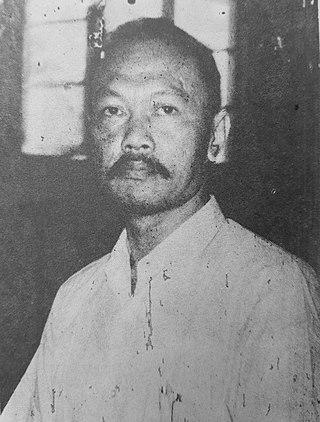
Mustafa Sjarief Soepardjo, also known as Supardjo, was a Brigadier General in the Indonesian Army. He was one of the leaders of the 30 September Movement, a group that killed six of the army's top generals and launched a failed coup attempt on 30 September 1965.
"Langit Makin Mendung" is a controversial Indonesian short story. Published in Sastra magazine under the pen name Kipandjikusmin in August 1968, it tells the story of Muhammad descending to Earth with the angel Gabriel to investigate the decreasing number of Muslims entering heaven, only to find that Muslims in Indonesia have begun fornicating, drinking alcohol, waging war on Muslims, and otherwise going against the tenets of Islam because of nasakom, a government policy during Sukarno's administration that combined nationalism, religion, and communism. Unable to do anything to stop the rampant sinning, Muhammad and Gabriel—having taken the form of eagles—watch the political maneuvering, crime, and famine in Jakarta.
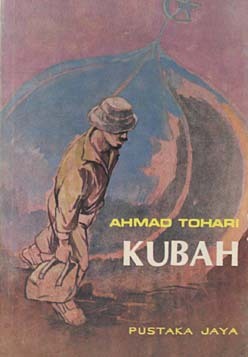
Kubah is an Indonesian novel written by Ahmad Tohari. It follows a poor man named Karman who becomes a member of the Indonesian Communist Party, only to find himself a victim of the ongoing political struggles in 1950s Indonesia. After the Party's destruction he spends twelve years as a prisoner at Buru before returning to his hometown and becoming a devout Muslim.

Pengkhianatan G30S/PKI is a 1984 Indonesian docudrama co-written and directed by Arifin C. Noer, produced by G. Dwipayana, and starring Amoroso Katamsi, Umar Kayam, and Syubah Asa. Produced over a period of two years with a budget of Rp. 800 million, the film was sponsored by Suharto's New Order government. It was based on an official history of the 30 September Movement coup in 1965 written by Nugroho Notosusanto and Ismail Saleh, which depicted the coup as being orchestrated by the Communist Party of Indonesia.
Howard Palfrey Jones was a United States diplomat whose career was focused on Southeast and East Asia. Between March 1958 and April 1965, Jones served as the United States Ambassador to Indonesia during the last years of the Sukarno presidency. He was known for his warm friendship and good rapport with President Sukarno, the first President of Indonesia and the country's premier nationalist leader.
